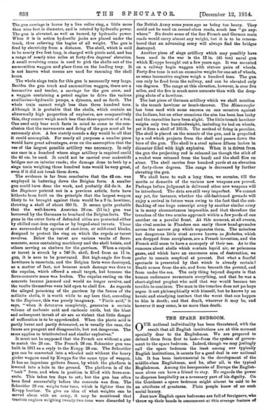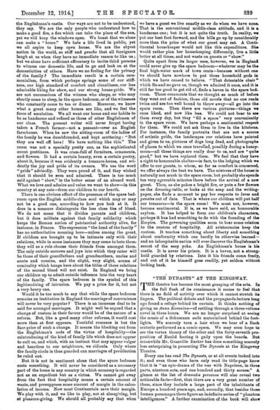THE SPARE BEDROOM.
OUR national individuality has been threatened, with the result that all English institutions are at this moment specially dear to the Englishman. We are prepared to defend them from first to last—from the system of govern- ment to the spare bedroom. Indeed, though we may jestingly call the spare bedroom the least among our typically English institutions, it counts for a good deal in our national life. It has been instrumental in the development of the middle-class Englishman, and be, after all, is the typical Englishman. Among the bourgeoisies of Europe the English- man alone can have a friend to stay. He regards the power to dispense hospitality as a necessary part of his dignity. On the Continent a spare bedroom might almost be said to be an attribute of greatness. Plain people know of no such social luxury.
Just now English spare bedrooms are full of foreigners, who throw up their hands in amazement at this strange feature of the Englishman's castle. Our ways are not to be understood, they say. We are the only people who understand how to make a good fire, a fire which can take the place of the sun, yet we will keep the windows open. We boast that we alone can make a " home." We hate a life lived in public, yet we all aspire to keep open house. We are the shyest nation in the world, so stiff and gauche that all foreigners laugh at us when they have no immediate reason to like us ; but we alone have sufficient effrontery to invite third persons to witness our domestic life, and to go and look on at the domesticities of others. Have we no feeling for the privacy of the family P The immediate result is a. certain cere- monialism, from which perhaps springs some of our stiff- ness, our high standard of comfort and cleanliness, our less admirable liking for show, and our strong house-pride. We are not unconscious of the witness who sleeps, or who may shortly come to sleep, in the spare bedroom, or of the witnesses who constantly come to tea or dinner. Moreover, we know what a great many other homes are like, and we feel the force of emulation. We all want our home and our habits to be as handsome and refined as those of other Englishmen of our class. The present writer will never forget having taken a French farmer—not a peasant—over an English farmhouse. When he saw the sitting-room of the ladies of the family he was dumbfounded, and kept muttering : "But they are well off here! We have nothing like this." The room was not a specially pretty one, as the sophisticated count prettiness. It was cram-full of furniture, ornaments, and flowers. It had a certain beauty, even a certain poetry, about it, because it was evidently a treasure-house, and evi- dently the joy and pride of its owners. We use the word " pride" advisedly. They were proud of it, and they wished that it should be seen and admired. There is too much said against " show," in the better sense of an abused word. What we love and admire and value we want to show—in this country at any rate—from our children to our hearth.
There is one obvious effect of the presence of the spare bed- room upon the English middle-class soul which may or may not be a good one, according to how you look at it. It does in a measure disintegrate the less close ties of blood. We do not mean that it divides parents and children, but it does militate against that family solidarity which keeps the Roman notion of patriarchal authority alive, for instance, in France. The expression "the head of the family '' has no authoritative meaning here—unless among the great, If children are brought up to be intimate only with their relations, while in some instances they may come to hate them, they will as a rule choose their friends from amongst them. The only outside sorrows and joys into which they enter will be those of their grandfathers and grandmothers, uncles and aunts and cousins, and the slight, very slight, aroma of comicality which hangs here about the titles of these relations of the second blood will not exist. In England we bring our children up to admit outside influence into the very heart of the family. The spare bedroom is the symbol of this legitimatizing of intrusion. We pay a price for it, but not a very heavy one.
Would it be too much to say that while the spare bedroom remains an institution in England the marriage of convenience will never be very popular ? There is an immense deal to be said for arranged marriages. It might well be argued that a change of custom in their favour would be of the nature of a reform. But, like a good many other reforms, it would cost more than at first appears. Youthful romance is but the face-price of such a change. It means the blocking out from the Englishman's code of the virtue of hospitality—the reintroducing of the kind of family life which does not appear to suit us, and which, with an instinct that may appear vulgar and heartless to our neighbours, we ridicule. Only where the family circle is thus guarded can marriages of predilection be ruled out.
But it is not in sentiment alone that the spare bedroom costs something. It will never be considered as a necessary part of the home in any country in which economy is regarded not as an expedient but as a virtue. We cannot get away from the fact that hospitality means a certain amount of waste, and presupposes some amount of margin in the calcu- lation of income. Now most Continentals save their margin. We play with it, and we like to play, not at almsgiving, but at pleasure-giving. We should all probably say that when
we have a guest we live exactly as we do when we have none. That is the conventional middle-class attitude, and it is a handsome one ; but it is not quite the truth. In reality, we put our best foot forward, and the bills go up by considerably more than the price of what our guest may eat. A Conti- tinental housekeeper would not like this expenditure. She would rather plan her housekeeping differently, live a little better at all times, and not waste on guests or "show."
Quite apart from its larger uses, however, we in England could never give up the spare bedroom—whatever may be the final high-water mark of town rents—because without one we should have nowhere to put those household gods in which we have ceased to believe. " That detestable chair" which So-and-so gave us, though we admired it once, and it is still far too good to get rid of, finds a haven in the spare bed- room. Those ornaments that we thought so much of before they went out of fashion, those old novels that no one reads twice and are too well bound to throw away—all go into the spare room. Then there are various pictures—things we once liked, and now like less. We could not bear to see them every day, but they "fill a space" very conveniently in the spare room. We have perhaps a sentimental respect for them. We could not ask them to live in the kitchens. For instance, the family portraits that are not a source of artistic pride, the landscapes our relations have painted and given to us, pictures of dogs long dead, and photographs of places to which we once travelled, possibly during a honey- moon—all these things are really dear to us, and are " quite good," but we have replaced them. We feel that they have a right to honourable shelter—in fact, to the lodging which we offer to our guests, to whom, so far as comfort is concerned, we offer always the best we have. The mistress of the house is naturally not much in the spare room, but probably she spends ten very agreeable minutes there before the arrival of a new guest. Then, as she pokes a bright fire, or puts a few flowers on the dressing-table, or looks at the soap and the writing- paper, she finds a moment to pay her respects to tares and penates out of date. That is where our children will put half our treasures—in the spare room I We must not, however, become sentimental. It is, as we have said, an honourable asylum. It has helped to form our children's characters, perhaps it has had something to do with the founding of the Empire. The governing qualities seem to bear some relation to the custom of hospitality. All aristocracies keep the custom. It teaches something about liberty and something about conformity which can hardly be otherwise learned— and no inhospitable nation will ever discover the Englishman's secret of the easy yoke. An Englishman's house is his castle. It is never his prison. It is a haven, not a strong- hold guarded by relations. Into it his friends come freely, and out of it he himself goes readily, yet seldom without looking back.















































 Previous page
Previous page